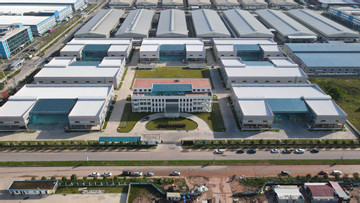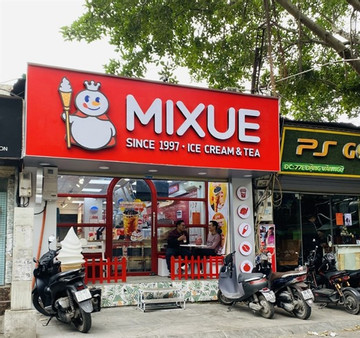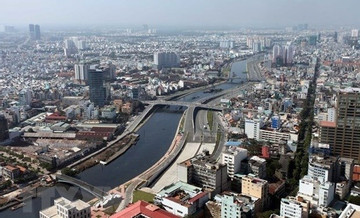- © Copyright of Vietnamnet Global.
- Tel: 024 3772 7988 Fax: (024) 37722734
- Email: evnn@vietnamnet.vn
FDI
Update news FDI
Chinese enterprises massively expand investment in Vietnam
In early June, two Chinese companies specializing in energy storage and battery manufacturing revealed their plans to invest a staggering US$1 billion in expanding production facilities in Vietnam.
Many foreigners continue to buying property in Vietnam
Surging interest from foreigners prompts questions about the growing allure of Vietnam's real estate market.
Foreign suppliers pay taxes of over 300 million USD online
Foreign suppliers have paid more than 7.36 trillion VND (312.8 million USD) worth of taxes through an electronic portal dedicated to them from March 21, 2022, according to the General Department of Taxation (GDT).
Industrial real estate developers thrive thanks to FDI
Real estate firms that develop Industrial Zones (IZs) that lease to foreign manufacturing enterprises with abundant capital and land are expected to prosper in the near future.
Experts pin high hope on FDI injected into VN industrial property market
Although the real estate sector has suffered a fall in foreign direct investment (FDI) attraction, experts are still optimistic about its prospects of the sector, especially the industrial segment which is described as a bright spot.
Hanoi to inspect 81 foreign-invested projects
Hanoi's Department of Planning and Investment and other local units and agencies will inspect 81 foreign-invested projects in the city this year.
Transport staples in need of funding
Foreign investment into transport segments continues to deviate despite the efforts of the transport sector and authorised agencies.
Vietnam tasked with gaining FDI edge
Boosting both the quality and quantity of foreign investment is being called an imperative for Vietnam as it attempts to improve on 2023 results so far.
Vietnam becomes attractive colocation markets for foreign investors
Vietnam ranked seventh among the top 10 emerging colocation markets globally with a market size estimated to hit 1.5 billion USD by 2026, according to a recent report by KPMG published earlier this month.
F&B more robust with boom in VN low-end market
The rapid expansion of foreign food and beverage (F&B) chains in Vietnam was making the domestic market more robust despite the trend of tightening spending in a global downturn.
Many FIEs report losses, pay low taxes
There are about 25,000 foreign invested enterprises (FIEs) in Vietnam, a small figure compared with the 800,000 operational Vietnamese enterprises. But FIEs are the major players in most business fields.
Contributions of foreign direct investment cannot be denied
The role of foreign invested enterprises (FIEs) has been enormous and cannot be denied in all aspects of our country’s economic and social life over the past 35 years.
FDI enterprises see contradictory performance on stock market
Besides the listed FDI enterprises doing business with profit, there are names that have been delisted due to losses.
Singapore biggest foreign investor in HCM City
Singapore was the biggest foreign investor in HCM City in terms of newly-registered projects and capital contribution for share purchases in the last five months, with 72 new projects worth $121.5 million.
Boeing unveils long-term investment plan in Vietnam
Steve Biegun, senior vice president of Global Public Policy at Boeing, unveiled the firm’s long-term investment plan during his May 26 meeting with Vietnamese Minister of Industry and Trade Nguyen Hong Dien in Detroit, USA.
Vietnam's five-month FDI rises sharply nationwide
The processing and manufacturing sector was the largest recipient of FDI, with more than 6.64 billion USD, accounting for 61.2% of the total pledges, followed by finance-banking, real estate, and science-technology.
MPI builds new investment incentives to match global minimum tax rule
The Ministry of Planning and Investment (MPI) is working on the design of incentives and measures to support new investment activities amid the upcoming application of the global minimum tax.
Vietnam remains leading destination for foreign investment inflows: experts
Vietnam has yet to lose its advantage as an attractive destination for foreign investment flows, although in the short term, investors are taking a careful consideration before making their decision.
PM orders enhancement of foreign investment attraction efficiency
Prime Minister Pham Minh Chinh has signed a directive clarifying tasks and solutions to enhance the efficiency of foreign investment attraction in the new period.
Vietnam will continue to be prime destination for FDI: VinaCapital
The global corporate minimum tax is unlikely to impede Vietnam’s FDI inflows given the fact that tax incentives are not the primary attraction for setting up a factory in Vietnam, said Michael Kokalari, chief economist at investment fund VinaCapital.



















